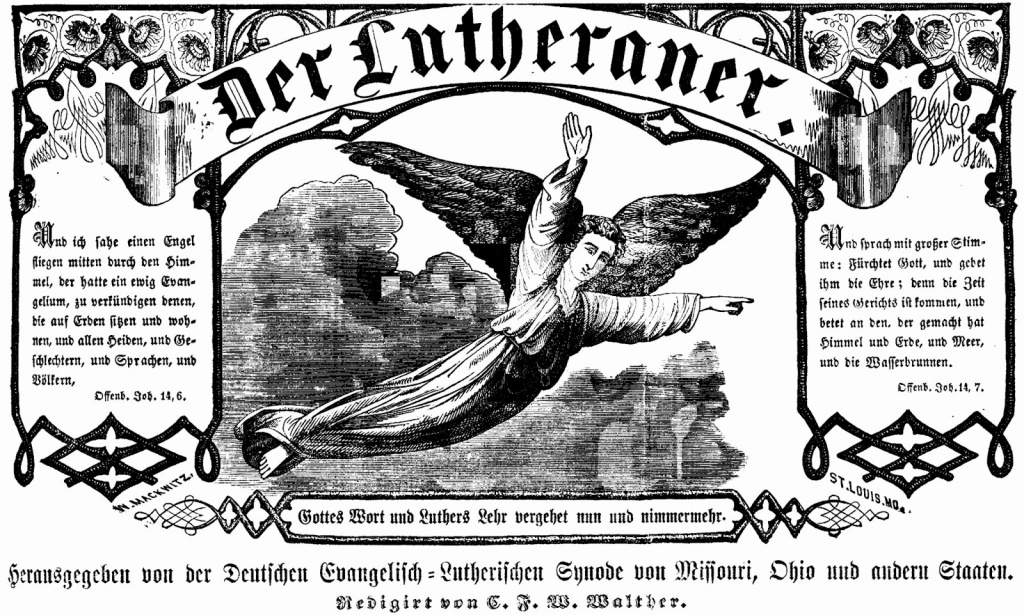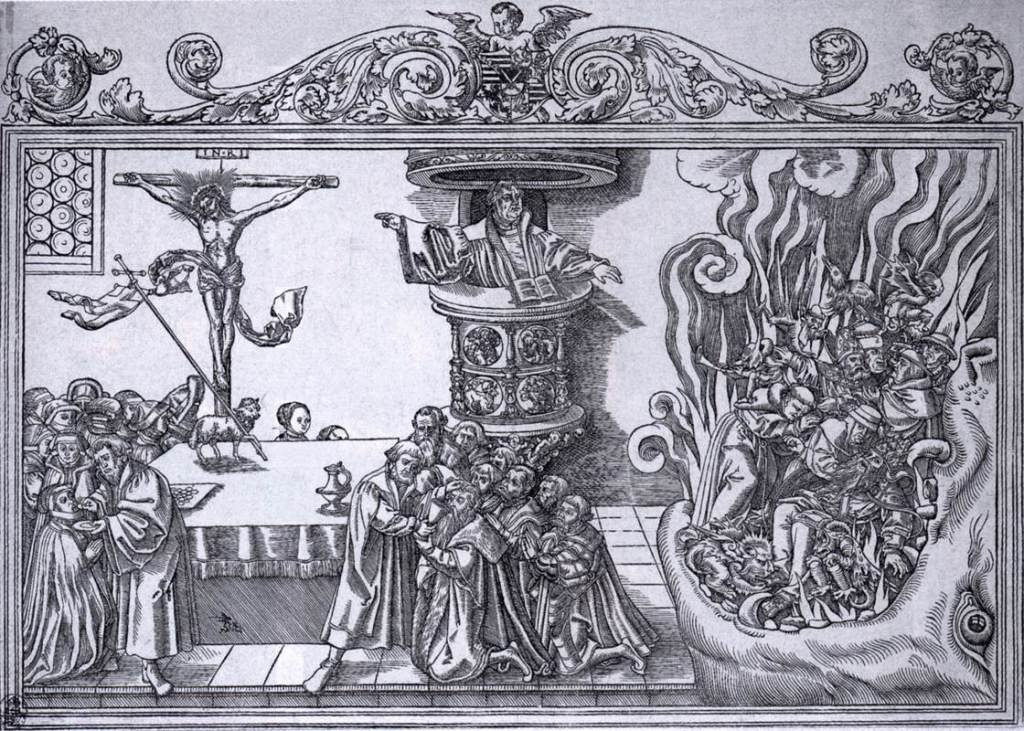Although The Lutheran Church—Missouri Synod currently asserts that there are, as its theologians put it, different “levels of fellowship,” so that certain actions which imply unity of faith do not actually declare doctrinal unity, and therefore it is permissible to, e.g., pray with Roman Catholics and the Reformed, this was not the view of the old Missouri Synod or of the orthodox Lutheran fathers. As proof of these claims, I now present the section from the 1927 Concordia Cyclopedia on “Unionism.”
Unionism. Religious unionism consists in joint worship and work of those not united in doctrine. Its essence is an agreement to disagree. In effect, it denies the doctrine of the clearness of Scripture. It would treat certain doctrines as fundamental or essential and others as non-essential to Christian unity — a proposition which could be defended on only one of two premises: that God either was unable to reveal His will and mind in such a manner as not to be misunderstood or was not willing so to reveal Himself. In the former case the wisdom of God is attacked; in the second, His goodness. A Christian who believes that God has clearly spoken through the prophets and apostles and through the Lord Jesus Christ cannot be a unionist. The indifferent and pacifist stand of the unionist is condemned in all those texts which bid us beware of false prophets and to be separate from those who deny the truth. Titus 1:13–14; 1 Tim. 2:12; 6:14; 2 Tim. 3:5; 6:3–5; Matt. 7:15; Jer. 23:28; Acts 20:29; Rom. 16:17; 1 John 4:1; 2 John 10–11. In the light of these texts all joint ecclesiastical efforts for religious work (missionary, educational, etc.) and particularly joint worship and mixed (promiscuous) prayer among those who confess the truth and those who deny any part of it, is sinful unionism. If we hold to the doctrine of the clearness of Scripture, such compromise of the truth cannot be tolerated, nor can it be defended by the plea that religious differences, after all, rest upon misunderstanding. When the Lutheran and Reformed theologians held a conference at Wittenberg to find a basis for union, Luther addressed Melanchthon as follows (1536): “In the first place, it will never do to admit that the whole controversy is based on misunderstanding. While this has often been said by our opponents and probably will be said again, it is simply not true as concerns ourselves, nor is it true regarding our opponents. To say that it was all a mistake would be a poor settlement, unworthy of so important a matter. In the second place, it will not serve to make any compromise for the sake of union. A compromise is in itself untruthful because its purpose is to unite things which are mutually opposed. Moreover, if a compromise is once accepted, consciences become so unsettled that they will finally believe nothing at all.” — Upon this clear and powerful utterance of the Reformer the theologian Rudelbach (Reformation, Luthertum und Union) remarks as follows: “When the difference is clearly understood and when controversy goes to every necessary length, we may conclude that there is a true love of union. The more careless we are in stating the differences and the more anxious to hide the sores, the farther removed we are from that unity of the Spirit which is the innermost essence of all true union.” The necessity of polemics and controversy as over against a religious pacifism, which demands peace at any price, was set forth by Luther on another occasion in the following terms: “The Christian minister must not only be a pastor who instructs his flock how they may be true Christians, but must also battle of the wolves lest they attack the sheep and seduce and destroy them with false doctrine. The devil is never at rest. But there are today many people who believe that the Gospel should be preached, but that we must not raise our voices against the wolves and preach against high churchmen. But even if I preach correctly and shepherd the flock with sound doctrine, I neglect a duty if I do not warn the sheep against the wolves. Fr what kind of builder would I be if I were to pile up masonry and then stand by while another tears it down? The wolf does not object to our leading the sheep upon good pasture — the sheep that have been fattened are the more eagerly sought by him —; what he cannot tolerate is that the watchdogs stand on their guard, ready to give him battle.” In his Conservative Reformation, Dr. C. P. Krauth, the General Council leader, remarked: “A Church which contends for nothing either has lost the truth or has ceased to love it. Warfare is painful, but they whose errors create the necessity for it are responsible for all its miseries.”
The striving for greatness in numbers and influence is a fruitful source of unionistic movements. Such emphasis upon externals will inevitably lead to the conclusion that the strength of the Church resides in organization and in the joining of great numbers. Dr. Loy (Lutheran, Ohio Synod), in his discussion of the Augsburg Confession, has rightly said: “An external union of all Christian churches into one grand universal Christian Church on earth is indeed neither necessary nor possible. Every though of that kind conflicts with the idea of the Church presented in Scripture as a spiritual kingdom of Christ, over which He reigns and which is composed only of true believers, who are known only to Him. It is not necessary that there should be such an external union, because the Lord does His saving work by means of His appointment, which can be effectually administered whenever two or three are gathered together in His name, and to the efficacy of which larger numbers and union with other congregations can add nothing. All the powers of the Church for the accomplishment of its saving purposes are as fully committed to a little country congregation in its confession of Christ and its possession of His Word and Sacraments as to the largest and most influential city churches. Even Lutherans are enticed upon the wrong road when they are induced to lay great stress upon their numbers and to fancy that their union in larger organizations will give them more power. The power for all legitimate purposes of the Church lies in the means of grace. Numbers may give us prestige and in that respect give us larger opportunity to ply these means. But it is an erring and disloyal thought that any concession in regard to the purity of the Word and Sacraments which might increase the number of believers, who alone constitute the Church, is permissible. A little company can do more by fidelity to the Lord and His Gospel and a faithful plying of these means in season and out of season, through evil and through good report, than could that company increased tenfold by a surrender to the liberal sentiment of men who cannot brook the exclusiveness of Christianity in its teaching that Christ can save and only Christ shall rule the congregation of the saved.” See Bible, Polemics, Prayer, Syncretism, Freemasonry and the various fraternal orders.
Reading the remarks of Rudelbach, one can see why, despite the assertions of the sacerdotalists at The Lutheran Church—Missouri Synod to the effect that polemics disturb the peace of the body of Christ, I have not ceased to rebuke the Synod in the hopes that it might return to the truth. Whether this has been of any effect, as shall be seen at Convention, I do not yet venture to make comment. However, the President of Synod has, in the documents for the coming Convention, effectively recanted his earlier position, which I and others rebuked him for. But that is neither here nor there, because even if these posts had no effect and were simply shouts into the wind (which, however, is not the case), the fact still remains, not to write against error would be a dereliction of the duty given me by God, on account of my God-given knowledge of Christian doctrine. For to whomever God has given much, of him much will be required.





